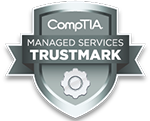Voice over Internet Protocol or VoIP isn’t new technology, it’s been around for many years! However, there are many myths and misconceptions about the technology that are floating around today. There are many rumours going around about VoIP – like that it’s expensive, a challenge to install, or that it’s unreliable.
This couldn’t be farther from being true! In fact, VoIP is not only extremely easy to adopt, but one of the most reliable ways for businesses to communicate.
Let’s take a look at some of the most common myths about VoIP – and the truth about each one:
Myth #1 – VoIP Isn’t Secure
In fact, VoIP is less vulnerable attacks than a traditional phone system. VoIP communication is encrypted and monitored and offers detailed call logs.
Myth #2 – VoIP is Costly
A VoIP phone uses your existing business technology infrastructure (i.e. internet connection and computer hardware). A typical business can save as much as 45 percent each month over a traditional phone service in part due to significantly reduced costs for long distance calls as well as the ongoing maintenance fees, and eliminating the costs associated with moving, adding or changing an employee’s phone line or extension.
Myth #3 – It’s Only for Large Companies
On the contrary, VoIP delivers features that provide more mobility and flexibility to small and medium sized businesses (SMB), which provides a competitive advantage and levels the playing field. Smaller businesses not only can provide better overall customer service and but also realize lower operational costs.
Myth #4 – VoIP is Unreliable
Cloud-based VoIP systems are actually extremely reliable offering 99.999% uptime. With a Unified Communication system, even if there is a power outage, call can still be forwarded elsewhere and answered.
Myth #5 – VoIP has Poor Call Quality
For businesses equipped with a robust internet connection and sufficient bandwidth, calls on a VoIP line sound as good as, in fact often times, better than a traditional phone system.
Myth #6 – You’ll Lose Your Number
Number porting lets you bring your existing business phone number with you when you switch to VoIP. You can transfer any number you use; analog, digital, or even a mobile number.
Myth #7 – Your Network Can’t Handle VoIP
A VoIP call only uses about 100Kbps bandwidth per line. Any DSL, cable or fiber connection provides plenty of bandwidth sufficient for multiple calls simultaneously.
Myth #8 – VoIP is Difficult to Set Up and Manage
There are a several different VoIP options. With a hosted system there is no PBX hardware on site, reducing or evening eliminating the capital cost outlay. It’s an ideal solution for a company at the end of a lease or with a unsupported phone system and looking to connect multiple locations and remote employees.
For businesses that are still committed to an equipment lease, VoIP services allow them to plug right into their existing systems. Both of these options allow businesses to take advantage of features such as automated attendant, hunt groups and call center routing.
In Conclusion..
VoIP is a fantastic solution for most businesses that provides incredible reliability, is super easy to manage, and will lower your telephone costs dramatically. Are you ready to learn more? Give NUMENTIS a call today and let us show you how switching to a VoIP solution such Microsoft 365 Business Voice can save you money and streamline your business!



